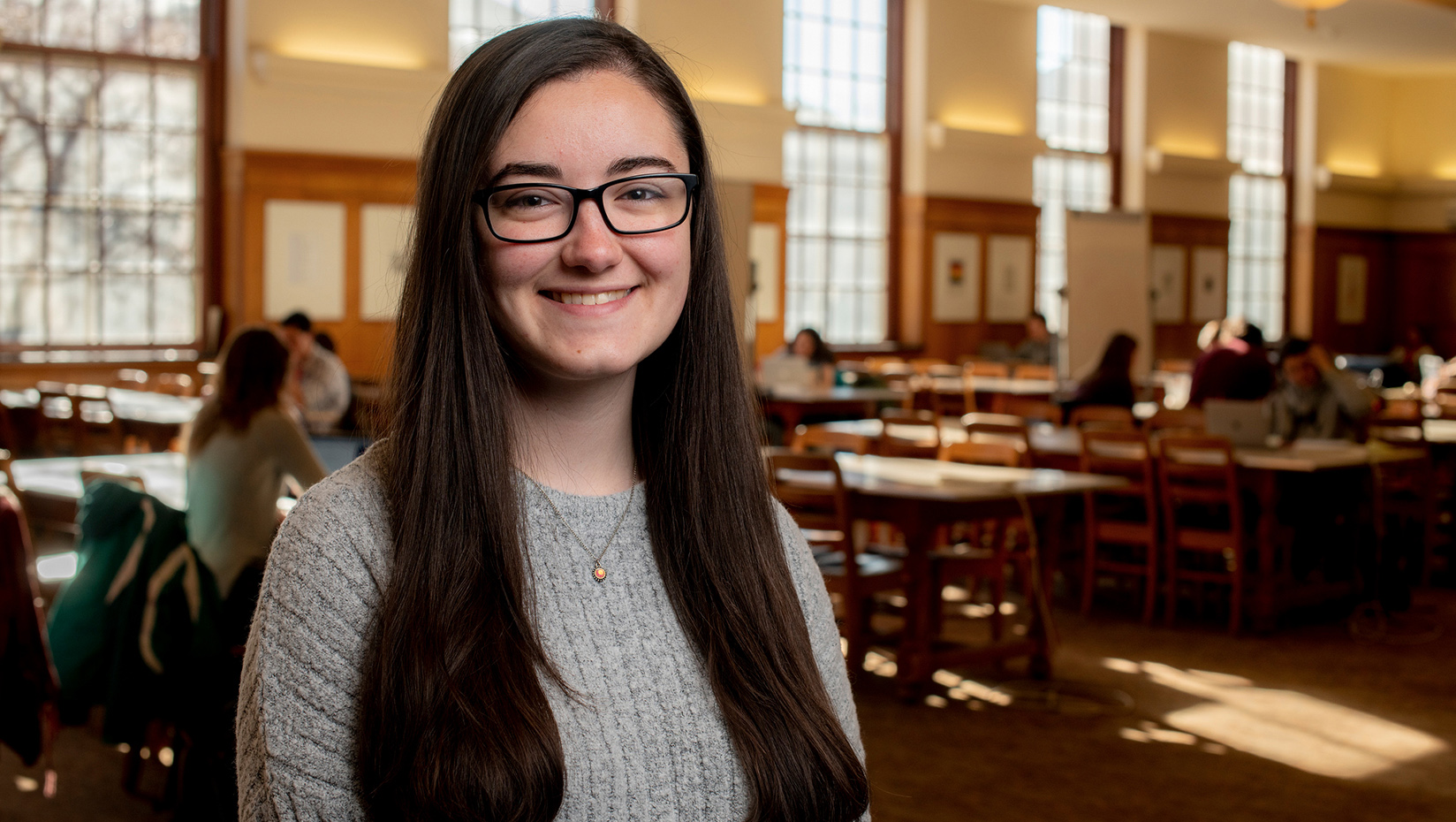
Harley Rogers: Political science student investigates how public perceives female leaders — past and present
How does the public perceive a woman running for president?
Harley Rogers aims to answer that question by connecting the past to the present through her investigation of public opinion surrounding female political leaders.
Rogers developed an interest in politics and history in high school after taking a series of social studies courses, as well as an early college history course.
“I quickly became fascinated in learning more about the history of government and the important people within government,” says the Lincoln, Maine native and third-year political science student at the University of Maine. “I also was particularly interested in the powerful female figures when they would show up.”
Her interest grew into a passion when she enrolled at UMaine and added a history minor almost immediately. She also chose a leadership studies minor, spurred by her career aspirations in politics.
“I love to build my understanding of the world throughout different time periods, and use that knowledge to understand politics today,” she says.
Rogers’ Honors thesis research developed from her interests and participation in the Margaret Chase Smith Recipe Research Collaborative, an interdisciplinary group of students and faculty who are passionate about food and interested in studying the role of recipes and cooking in politics and public life, as well as issues related to history, gender and the environment.
The members of the collaborative analyze Smith’s personal recipes as historical artifacts to learn more about the different facets of her life, and Rogers says the interdisciplinary nature of the collaborative promotes individual research to encourage “more unique approaches to the same woman’s life.”
For her thesis, Rogers is working with Rachel Snell, a lecturer in the Honors College and a co-founder of the collaborative, and Amy Fried, a professor in and chair of the Political Science Department.
Rogers is comparing the gendered expectations found in newspaper coverage of Margaret Chase Smith during her 1964 presidential primary run with coverage of Hillary Clinton’s presidential primaries in 2008 and 2016.
“Despite the 60-year difference, both women faced commentaries on their sex and how it would negatively impact their ability to be president, despite both having years of experience in elected positions,” Rogers says.
And this influenced their actions in leadership roles. For example, Smith exhibited traditional expectations of women, while simultaneously serving in Congress for several decades.
“She would frequently cook for other governmental officials on weekends and would send out recipes from her Senate office to constituents who asked for them. It is my expectation that this was an attempt, subconscious or not, to maintain the expectations of women at the time,” says Rogers.
“On the other hand, Clinton has maintained a career-woman image in her time in politics, and frequently challenges the traditional role of women. Due to this, she is often referred to as ‘cold’ and ‘distant.’”
Rogers plans to compare how the two women’s projected identities influenced their public perception during their presidential campaigns. The project brings her to the Margaret Chase Smith Library to look at newspaper clippings of all the articles featuring Smith. Rogers will focus on articles printed during the primary.
“The newspapers also provide many public polls taken during 1964, giving me direct quotes from individuals of the time and their thoughts on the possibility of a woman president,” says Rogers.
For example, these two quotes were published in the Feb. 3, 1964 issue of the Independent Press Telegram in an article titled “Should the Next President be a Woman?” and give a glimpse into the range of opinions that existed at the time:
“A woman putting her hat into the ring is either very silly or very courageous. But more power to her. Someone had to start it.” — Elizabeth Hudson
“Women make wonderful wives, but I think top leadership roles belong to men. I think we should keep it that way.” — Bill Boyd
Rogers plans to compare her findings to articles from those same papers, if they are still in publication, that feature Clinton, and dive into the research full time this summer.
“In the end, I would like to look at how opinions have changed, what ideas of women’s roles have stayed consistent, and look at how female politicians have to make conscious decisions in presenting their identity in order to find a balance of femininity — feminine enough to be well liked, but not too feminine that people would wonder [about] their capability in the role,” Rogers says.
Outside of research and classwork, Rogers loves spending time with family and friends, going to concerts with her fiance, and taking care of their bearded dragon, Francis.
